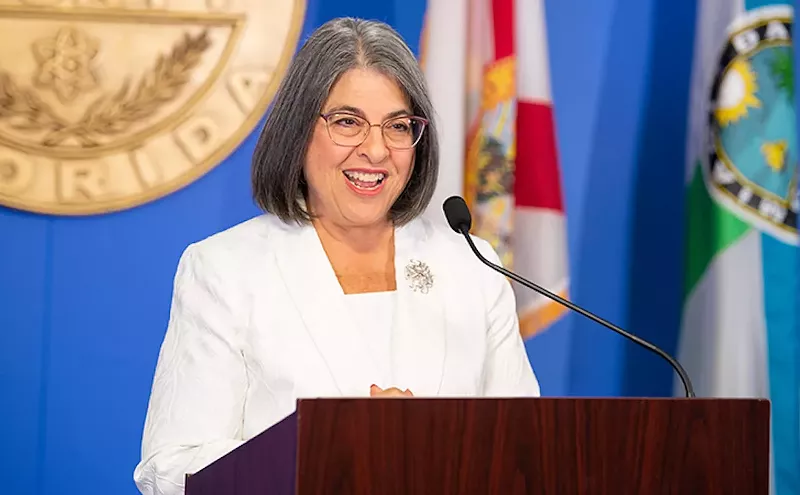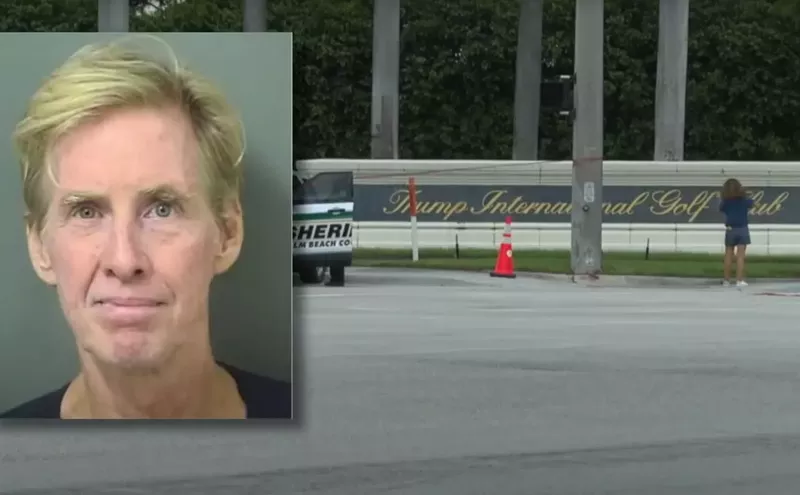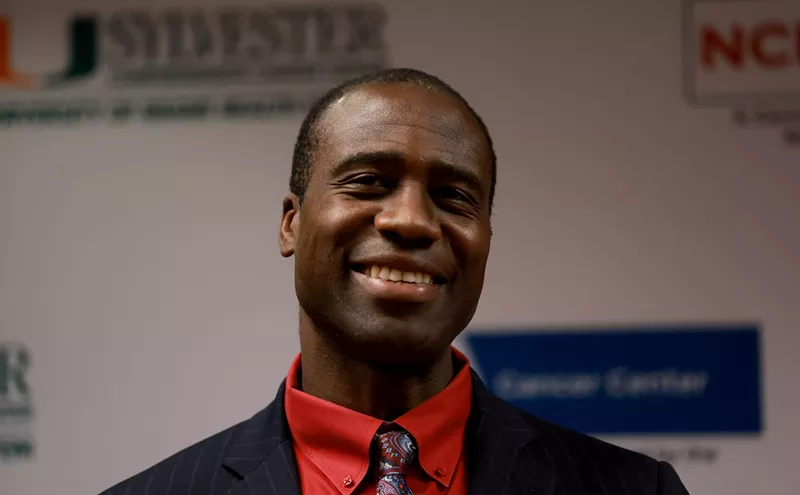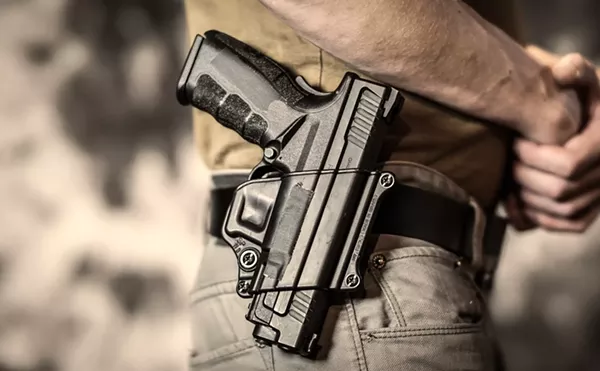Rhett Fuller paces the cool living room of his palm-shrouded house in a suburb of Belize City. He cradles the cell phone to his ear and admits the truth: Twenty years running from the law has taken its toll. "Every single day, I regret my choice," Fuller says, his lilting Caribbean accent masking a grave tone. "No matter how strong they went after me, by now I'd have served my term, been out of jail, and moved on with my life instead of constantly dealing with this."
Fuller doesn't look like a fugitive. Rather, he's the respectable-businessman type, with cropped, curly black hair; a high, smooth forehead; and an easy smile.
Down the hall, his wife Ann tends to their three young kids.
In Belize City, the largest town in Central America's smallest nation, Fuller is well known as the co-owner of a construction firm, Fabro's Industries. Nationwide, he's a celebrity for another reason: For more than a decade, he has waged a public fight to avoid returning to Miami on charges he helped murder a man in 1990.
Fuller's epic case is an extreme example of a daily fact of life for Miami-Dade prosecutors. In a county where more than half the residents were born in another country, every year dozens of accused killers, drug smugglers, and rapists return to their homelands rather than face arrest and trial here.
If they hail from one of the many Latin American countries that don't see eye-to-eye with Uncle Sam — for instance, a jungle nation that doesn't extradite its citizens or an island ruled by an ancient, bearded dictator — they can evade justice for years, decades, sometimes forever.
"No other State Attorney's Office in Florida deals with suspects hiding abroad anywhere nearly as often as us," says Barbra Piñeiro, head of Miami-Dade's extradition unit. "We've got open cases with almost every country in South and Central America. It's the flip side of being such an international city."
Fuller's case is unique, though, not only because he's been living openly in Belize for so long since he took part in a botched North Miami Beach drug deal turned deadly, but also because his struggle has wound such a strange course from London high courts to mildewy Third-World jails to accusations of police extortion.
Now, finally, the odyssey is ending, and Fuller is ready to come in from the cold.
"This has affected every part of my life now for 20 years," he says. "My family, my business, my health. I'm tired. I'm just tired."
Every extradition begins with a phone call to Piñeiro's fifth-floor office across from the Richard E. Gerstein Justice Building.
Some days, it's an FBI agent in La Paz, Tegucigalpa, or Mexico City. Other times, it's a sargento in Uruguay or a constable in Jamaica. Once, a particularly canny hotel clerk in Belgium was on the line. They all have the same message: "They'll say, 'We think we've found the guy you're looking for,'" Piñeiro says. "Immediately, my adrenaline starts pumping."
In just the past couple of years, the cheerful prosecutor has chased a convicted murderer who staged a Hollywood-style prison escape to Mexico, a rapist in Peru who impregnated his stepdaughter, a Puerto Rican who might have killed his ex-girlfriend, and a Spanish double murderer. The most recent case involves a 2010 Boynton Beach cop of the year, David Britto, who fled to his native Brazil after getting busted for methamphetamine.
But after that first exhilarating phone call, each case takes years. Thanks to complex treaties, red tape, corruption, and incompetence, returning a murderer hiding abroad is among the toughest tricks in law enforcement.
"Most people, even other prosecutors, don't understand how complex it is to extradite someone," says Piñeiro, who has "well over a hundred" open cases in foreign lands at any given moment. "They say, 'You know exactly where he is — just bring him back.' But it's not nearly that simple."
A tough-minded pioneer, Piñeiro broke barriers in the U.S. Army as the first woman to simultaneously leap out of planes as a paratrooper and serve in the Judge Advocate General Corps Trial Defense Service at Fort Bragg. She graduated from the University of Miami's law school in 1979 and took a prosecutor gig in 1985. In 1990, she became Miami-Dade's only full-time state attorney working extraditions.
After the first tip, Piñeiro must decide whether it's worth bringing back the fugitive. The average extradition runs taxpayers $40,000 and 36 months of work, so if the case isn't strong or the crime isn't heinous, she passes.
With some maniacs on the run, though, cost is no barrier. Take Juan Jesús Fleitas.
The Cuba native, a short thug cut like a chiseled underwear model, arrived during the Mariel boatlift and immediately began breaking into houses. On Halloween night 1985, Fleitas and a friend tried to burglarize a West Hialeah home they'd scouted out while doing odd jobs. But when 21-year-old Miguel Rudelando Pérez came home unexpectedly, Fleitas panicked and shot him three times in the face with a .45-caliber machine gun.
Fleitas's name didn't start gnawing at Piñeiro, though, until 1995. That's when the convicted murderer and five cellmates escaped Glades Correctional Institution after digging a 45-foot tunnel under the prison church. Four were quickly caught and one was shot and killed by police, but Fleitas disappeared into the night and then absconded to Mexico. It took more than a decade to bring him back.
"A case like Fleitas, it eats you up because you've already convicted him," Piñeiro says. "You've got to find him, and you've got to bring him home."
Other recent fights have clawed at her conscience. There's Jovany Araujo, a block-headed, flat-nosed Peruvian who bought an airline ticket to Lima after knocking up his 14-year-old stepdaughter. And Roque Torres, a 60-year-old, bland-accountant look-alike who hopped a plane to Nicaragua after police found his ex-girlfriend in the Everglades, her head hollowed by a single shot to the temple. And Carlos Santys, who brutally gunned down two business rivals in Doral before dissolving into the Spanish countryside.
In each case, Piñeiro has had to navigate a maze of roadblocks. First, she needs a federal warrant. FBI agents or U.S. Marshals must get a positive ID in person, all while avoiding local cops and the fugitive. "We can't tip off the local authorities, because the suspects often have political ties at home," Piñeiro says. "They'd warn them off."
If the runaway isn't from the country where he's hiding, Piñeiro can sometimes win a deportation order within a few weeks.
But if he's a citizen of his hideout nation, international appeals can take years. And some countries, most notably Brazil, refuse to extradite their citizens altogether.
Then there's Cuba. If a criminal flees there, prosecutors are SOL. There's a storied history of fugitives hiding under Fidel Castro's nose, most famously Robert Vesco, a criminal financier who spent 25 years in Havana dodging fraud charges before dying in 2007.
Others have pulled the same trick. Convicted cop-killer and black militant Joanne Chesimard, AKA Assata Shakur, has lived openly in Cuba since 1984; William Potts has also hidden out since 1984, when he hijacked a Miami-bound flight and diverted it to Havana. Since the FBI began cracking down on Medicare fraud in Miami two years ago, more than 150 wanted suspects have bolted to Latin America, mostly to Cuba, according to a Miami Herald report in July.
Miami prosecutors don't keep statistics on open extradition cases, and nationally, the Department of Justice tracks cases only from a few of the busiest international havens. Federal numbers do offer one clue to Piñeiro's work: Last year, 148 prisoners were extradited from Colombia to the United States, mostly through Miami. That number has risen drastically from 2000, when only 13 were sent packing from Bogotá.
Cuban cases aside, once Piñeiro finds a criminal living abroad, the wheels of justice usually grind slowly to bring him home — generally it takes three to five years.
That's why Rhett Fuller's case is so amazing, and so agonizing.
"Fuller has been running as long as I've been in this office," Piñeiro says. "That's one I can't wait to close."
When Rosalind Fuller talks about her grandson Rhett and his children in Belize, her aquamarine eyes well up and her weathered face creases. The 87-year-old sits in a plastic lawn chair on her small front porch in Hollywood. Next door, a local cop waxes his cruiser in a driveway and glances over suspiciously every few minutes.
"Rhett's been through a lot already," she says, her voice reedy but still melodic with its Caribbean accent. "We don't know what's going on with his case. But he's got three little kids, and one of them is autistic. I don't understand why this is still carrying on today."
Fuller's 20-year dash from the law has torn emotional rifts in his family from Belize City to Broward. Before that one terrible night in a shabby North Miami Beach apartment, though, he never could have expected his life would turn into an international manhunt.
He was born in October 1970 in Belize City, a sun-blasted town of 70,000 on a lush peninsula jutting into the Caribbean Sea. His mom, Veradale, was descended from Belize's native Indians and English captains who'd emigrated to British Honduras, as Belize was known until 1981. They harvested tropical wood. The family's lineage is obvious in Rhett's light skin and his grandmother's startlingly bright-blue eyes.
Belize went through years of turmoil after achieving independence from Britain. When Rhett was 10 years old, Veradale and Rosalind decided to join the scores of relatives who had moved to South Florida looking for work.
In the States, Rhett was a normal immigrant kid. At Fulford Elementary in North Miami Beach, he picked up the trumpet, blasting strident tunes through the small apartment where his grandma and mom raised him. (His dad, who had never been around much, stayed in Belize.) "I only worried about [Rhett] because he had really serious asthma," Rosalind says.
At North Miami Beach High, Rhett was a lead trumpeter in the jazz ensemble. In yearbook photos, he's a serious-looking, bright-eyed teenager wearing a skinny black tie. After graduating in 1989, he enrolled at Miami-Dade Community College and then enlisted in the Navy. "I wanted to get my citizenship and to see the world," Fuller says.
In May 1990, he had a few months to burn between classes and basic training, which was scheduled to begin July 4. So he bummed around with two close friends: Carlos Cuello, a heavyset teen who had emigrated from Belize around the same time as Rhett, and Alex Napolitano, a thin, long-faced pal from high school.
"Rhett was just a punk kid. He wasn't that bad," says Ed Hill, a North Miami Beach police detective who would later spend decades tracking him. "He fell in with a bad crowd, especially Carlos Cuello."
Life turned upside down on May 22. Fuller still disputes the police's description of what happened that afternoon, but the basics are clear.
The three friends met at Napolitano's shabby apartment, a one-story, dirty yellow building a few blocks west of Biscayne Boulevard on NE 172nd Street, to smoke weed. Around 4:30 p.m., two older guys named Larry Miller and Jerry Hiebert, who was 26 years old, allegedly showed up to buy 15 pounds of the stuff from Cuello.
In court documents, Napolitano says all three friends knew ahead of time that Cuello's deal was a "rip-off." All three were armed: Cuello and Napolitano with .38s and Fuller with a shotgun. When the pair of buyers walked in, Cuello ordered Miller to lie on the ground, pistol-whipped him, and — when he fought back — shot him twice in the arm and once in the leg.
Fuller "engaged in hand-to-hand combat" with Hiebert, the victim told police, according to depositions. Fuller grabbed a hammer and "hit him repeatedly over the head" until he lay stunned on the ground. (New Times reached Napolitano, but he declined to speak on the record.)
Fuller says he had no idea anything violent would go down that afternoon. "Basically, you're a kid having fun, you hang out with the guy selling weed, and you smoke pot all day," he says. "Someone came to buy some weed, there was an argument, it escalated into pushing and shoving, and then somebody got shot. I saw it all, but I had nothing to do with it."
Either way, with Miller bleeding to death and Hiebert knocked out, the three friends ran out the back door, hopped a fence, and sprinted away.
Fuller sought advice from everyone he could think of — relatives, friends, even his Navy recruitment officer in California. "Basically everyone was saying, 'Just go home,'" he recalls. "I was still a teenager. I didn't really know what was at stake. I just knew I'd be safe back in Belize."
It wouldn't be easy to flee the country. An arrest warrant was out for the three friends. Police captured Napolitano first. The other two didn't know what to do. A few weeks after Miller's murder, a Miami-Dade social worker named Edwin Malawey received a strange phone call from his daughter. She wanted him to talk to some friends of hers "named Rhett and Carlos."
"It was a horrible story they told me," Malawey later testified in court. "It was about a drug deal gone bad. A guy named Carlos had emptied his clip into another kid... They wanted my advice about what to do."
Malawey told them to turn themselves in right away.
Instead, the two friends caught a bus to Chicago. They hitchhiked and bused their way to California, then New Mexico, and then across into Mexico.
From there, it was a short week or so to the porous border with Belize.
Back in his homeland, the thin, internationally wanted 19-year-old calmly re-enrolled in high school, reconnected with old friends, and started a new life. "He never mentioned anything about being wanted in the United States for murder, nothing about that at all," says William Ysaguirre, a newspaper editor in Belize City who made friends with Fuller soon after his return. "I think his relatives told him: 'Look, you messed up and could have been in really serious trouble. You've got a chance to start fresh; don't mess it up again by talking about what happened.' "
By all accounts, he became a stand-up citizen. He began working as a manager at one of the hotels catering to cruise ship passengers; then he held a job at an advertising firm before landing a gig with his brother-in-law's construction firm.
A few years after returning home, he met Ann, a pretty local with caramel skin and long, dark hair. They were married and eventually had two sons and a daughter. Fuller was open about his Miami case, Ann says. He even regularly phoned Ed Hill — the North Miami Beach police detective in charge of Miller's murder — to check in. Whenever they caught Cuello, Fuller said he told Hill, he would return to Miami to testify against him.
It seemed Rhett Fuller had become a different man in Belize. He started going to church and dedicated himself to his family. "I backslide a lot, but it's my family that keeps me going," Fuller says. "I'm not perfect. But I do go to church, and I do try to be a good man."
His construction firm, meanwhile, gave regular work to many locals in the depressed economy and built high-profile projects such as the World Cup-qualifying soccer stadium that was recently finished in Belmopan, the capital.
"Everyone makes mistakes," Ann says. "Rhett is a good man who has atoned already many times over."
Fuller's story took the first of several bizarre turns in 1997. That October, a local police officer showed up at his home and carted him off. When he walked into a humid interrogation room, Fuller found Hill with two other Dade cops. The detectives had finally caught a break in Miller's murder case two years earlier, when the New York Police Department had responded to a domestic disturbance and found Carlos Cuello's girlfriend so angry that she flat-out said, "This guy's wanted for murder in Florida."
As he had in the past, Fuller quickly offered to testify if he wouldn't get slapped with a first-degree murder charge. "I told them everything because I thought we were trying to help each other out," he says.
But the three detectives wanted more, Fuller says. "Hill said they had this other murder, this Maugeri woman. They knew that Carlos had killed her too, and they needed me to testify against him."
Indeed, Marisa Maugeri's murder had bedeviled the North Miami police force for almost a decade. The 30-year-old paralegal had mysteriously been shot through the eye in a Publix parking lot the night before Thanksgiving in 1989. Maugeri's brother-in-law was an FBI agent who had kept pressure on the cops.
With Cuello's arrest, dominoes seemed to fall into place. Cuello matched the description of her killer, he lived in the neighborhood at the time, and he had no alibi. Fuller's testimony could be the last straw.
The only problem: Fuller said he had never heard Maugeri's name before.
"I thought, Holy shit, I'm in trouble now," he says. "I was scared as shit. But right there, I told Ed Hill no. I knew it was wrong. I wasn't going to pin that on Carlos."
The agents let Fuller go back to his wife and kids. But less than 12 months later, the local police were back. A Miami grand jury had indicted him for first-degree murder in January, and on October 21, 1998, he was arrested.
Fuller's file was now officially open on Barbra Piñeiro's desk.
She had no idea how hard it would be to bring Fuller back. The case of Fleitas, the machine-gun killer who escaped from Glades Correctional in 1995, provides one perspective. As prosecutors suspected, Fleitas had fled to Mexico, ending up in Mérida, the touristy capital of the Yucatán Peninsula, where he waited tables at a seafood restaurant in a high-end mall.
His fatal mistake was to keep his other profession — home burglary — going on the side. Just as in Hialeah, one of those break-ins went wrong. On August 2, 1997, he shot a woman point blank with a .38 and was caught a few blocks away. At first he told cops the woman had attacked him; then he claimed he was "squeezing" her for a gambling debt with a local mob. They didn't buy it.
His fingerprints quickly popped up as a match for Piñeiro's escaped convict, but Fleitas insisted he wasn't the fugitive. The Mexican authorities were confused enough to ask a visiting Miami Herald reporter if he'd seen photos of Fleitas to confirm it was him.
By repeatedly claiming mistaken identity, Fleitas was able to stay in Mexico for 14 years. Not until this past July 28 was he finally extradited to Miami.
"We really worked that case for 14 straight years. It was almost constant pressure from our office to see that through," Piñeiro says.
Another clue to Rhett Fuller's fate is that of Jovany Araujo. The then-44-year-old Peruvian immigrant was charged in 2004 with repeatedly raping his 14-year-old stepdaughter. But he took off to Peru before cops could nab him.
Piñeiro quickly identified him in Lima but had to work for four years to get him back.
In many such cases, the wait is worsened because the victim's family becomes apoplectic over the delays. "They come to my office, angry, in tears, not understanding why it takes so long," she says. "It can be brutal."
In 2008, Araujo was at last extradited; he was convicted and received 30 years in prison.
Sometimes, fugitives do Piñeiro's job for her. Back in 1982, a Spanish immigrant named Carlos Santys was furious when security guard Roberto Camba reported him to police for writing a bad $1,000 check in exchange for a 1979 Datsun. So he stormed into the guard's office, fatally shot a secretary, and then blew away the guard.
Santys ran and for 25 years lived under the radar in Spain. But in August 2007, he tried to fly to the United States. He was turned away at the gate and then quickly arrested back in Spain. Piñeiro had him extradited within a year, and in July 2010 he was sentenced to 40 years.
After his indictment, Rhett Fuller spent nearly two years in a Belize prison, sitting on death row in a six-by-nine-foot cell he shared with a convicted double murderer. The pair looked out a window each day to see two moldy gallows in a weedy courtyard. Finally, Fuller was released on bail pending appeals and began making the local TV-news rounds. He became a magnet for a strong anti-U.S. sentiment that pervades tiny Belize, a nation of only 300,000 people.
"Belize doesn't get a lot of attention from the United States," says Bruce Bagley, chair of the University of Miami's international studies department. "There's a lot of resentment toward U.S. foreign policy, so a guy who fights a U.S. extradition order can win some fans."
Fuller's attorney, Eamon Courtenay, filed numerous appeals. The heart of his argument was that Hill had coerced damaging information out of Fuller by promising a deal.
Hill says that allegation is ridiculous: "I'm in no position to offer anyone deals in the first place. I'm a detective, not a prosecutor."
Belize's courts eventually agreed with Hill and rejected Fuller's appeal first in June 1999 and then again in 2002. But the process has also been comically slow. In one hearing, after a 12-month delay, a prosecutor admitted she hadn't had time to prepare a single filing. "I am the only [prosecutor] available to do court matters right now," she told an exasperated judge.
Fuller's claim that Hill was duplicitous, meanwhile, gained some legitimacy in 2007 when the detective had his own bizarre run-in with the law. In May of that year, Hill arrested a 44-year-old house painter and driveway paver named David Superville on second-degree murder charges. Superville had a much younger wife, a gorgeous, 30-year-old Russian named Anna Gulevitskaya whom he'd met online and called a "mail-order bride." With her husband in jail, Hill bought her hotel rooms, tickets to Russia, and dinners, and the relationship turned sexual.
When Superville got out on bail six months later, he learned from former customers that his wife was shagging the cop who had booked him: Ed Hill. Internal affairs investigators soon found Hill guilty of conduct unbecoming an officer and civil service violations, and suspended him for three weeks. He was suspended again in July 2009, after a friend of Gulevitskaya's was murdered in West Little River. Hill showed up at the crime scene and pretended to be part of a "Russian task force" to draw information out of Miami-Dade police investigators. Again, he was found guilty of conduct unbecoming an officer and neglect of duty.
Just last week, a handwriting expert testified that Hill had forged Superville's signature on a form waiving his Miranda rights. "What I've read here is appalling," Miami-Dade Circuit Judge Jorge Cueto said. The murder case against Superville might be dropped altogether because of Hill's ethical lapses.
Rhett Fuller believes this behavior shows Hill would have been willing to illegally strong-arm him into pinning Maugeri's murder on Carlos Cuello in exchange for a deal. "I blame this whole situation today on Ed Hill," he says. "Obviously, the mistake to run in the first place is on my shoulders. But I trusted him, and I think this whole case today and the drive to bring me back to Miami comes from his being angry that I wouldn't help them with Maugeri's case."
Hill declined to talk about his internal affairs cases, but he laughs at Fuller's claims: "There's zero truth to that."
Fuller began talking to New Times in August, against his lawyer's and his family's wishes, for a simple reason: Twenty years of looking over his shoulder was killing him. He wanted Miami to know he's ready to come home — even if he thinks he's getting screwed.
The impetus for his decision came August 9, when the United Kingdom's Privy Council — a wig-wearing body of London judges who act as a kind of Supreme Court for former British colonies — rejected Fuller's last-ditch effort to escape his murder indictment.
"You can't keep on fighting forever," he says through a fuzzy phone connection from Belize. "Can you imagine for years waking up every morning wondering if they're coming to put you in jail again?"
In the eight-plus years he has been out on bail awaiting the high court's decision, Fuller has been alternately optimistic and dejected, ready to fight and struggling with alcohol and depression. His situation is all the worse because everyone else involved in Larry Miller's murder has already served time and moved on.
Alex Napolitano spent a little less than a decade in North Miami's minimum-security lockup; he was released in January 2000. He has rebuilt his life, working as a network engineer and living in a comfortable, middle-class home worth $125,000 in West Kendall.
Carlos Cuello, the gunman who ran with Rhett Fuller, is also free. After his girlfriend ratted him out in New York in 1995, he was convicted of first-degree murder in Dade court in 1998 and served ten years. He was released in 2008. It's not clear where he lives now.
Marisa Maugeri's murder isn't a mystery any longer, either. In 2006, prosecutors charged 32-year-old Thomas Pennington — a felon already serving a 15-year murder term — with her death. His case goes to trial this October.
And Ed Hill, the detective whom Fuller believes is trying to screw him, has served out his suspensions and is back on the beat.
On August 16, Fuller told New Times he'd turn himself in the next day at the moldy Belize jail. "My lawyer doesn't want me to go, but it's time," he said.
But then he changed his mind.
Fuller stopped answering the phone. In his last email, he had this to say: "My local lawyer... is advising me that he suggests we appeal to the minister, and if I lose the case, take it to judicial review, then the appeals court, and finally to the Caribbean Court of Justice. This can conceivably drag out for another eight to ten years."
On August 22, local police took him back into custody, and last week the foreign minister ruled that Fuller must return to Miami to face trial. Belize, unlike Brazil, has no constitutional barriers to sending its citizens abroad on criminal charges. Fuller has filed yet another appeal, which the local courts are supposed to rule on within 15 days.
Piñeiro is awaiting their call. But she's not naive: "With this case, I won't believe Fuller is back until we actually have him in custody."
Regardless of Fuller's accusations, his excuses for running, and his wife's passionate pleas to supportive Belizeans, Detective Hill says there's one thing to keep in mind, as with every absurdly drawn-out extradition battle:
"We have a victim here. I don't care if Larry Miller was a drug dealer — he's a victim," Hill says. "His life was taken in violence. Someone has to answer for it. Justice has to be done."












